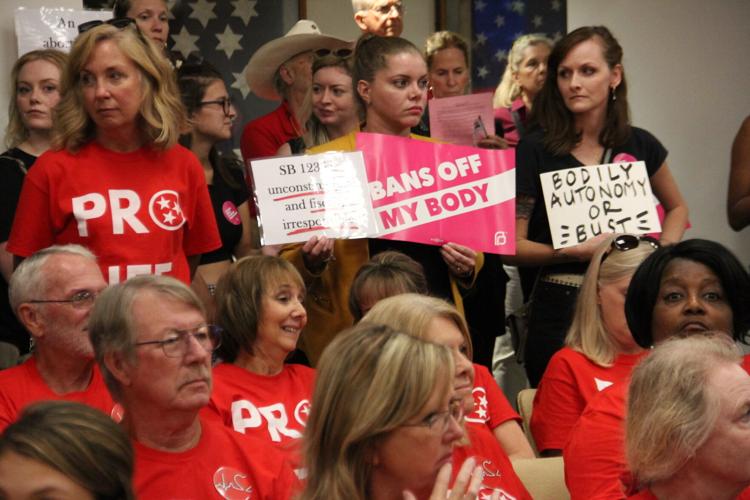In the upcoming state legislative session, Democrats have teamed up to introduce a bill that would fully legalize abortion, while a Republican senator is looking to focus on exceptions to Tennessee’s abortion ban for fatal fetal anomalies.
The Fundamental Right to Reproductive Health Care Act (HB1626/SB1590) was introduced by Sen. London Lamar (D-Memphis) and Rep. Aftyn Behn (D-Nashville) last month.
When asked by news outlets if they thought the bill was practical, both lawmakers let out nervous laughs — Lamar on WKRN earlier this month, and Behn when she spoke with Scene sister publication the Nashville Post last week. The bill would repeal 19 laws, and Behn describes it as “a narrative piece to show just how draconian our abortion ban is.”
“The purpose of this bill is to radically reimagine what’s possible in this state and to offer people that vision,” says Behn.
Meanwhile, Sen. Richard Briggs (R-Knoxville) has teased what he calls the Freedom to Have Children and a Family Act, which highlights the potential for complications during pregnancy that could prevent future pregnancies. He’s working with Vanderbilt University Medical Center’s government relations team and the Tennessee Medical Association on the bill, which he says is not yet finalized.

Aftyn Behn
“Our organization would support efforts that provide greater clarity in the law and allow physicians to take appropriate medical actions,” says Russ Miller, a spokesperson for the TMA.
Adds Kylie Avery, a spokesperson for VUMC: “VUMC is working with numerous members of the Tennessee General Assembly to inform legislation that will protect women who are pregnant with a fetus that cannot survive after pregnancy. In these limited circumstances, physicians need to be able to act to preserve fertility options for a woman who would like to have a family in the future.”
Briggs notes that some babies with fatal anomalies may live for a few days or hours, and some parents may not want to carry that pregnancy to term.
“If you’re carrying a child, you’re a parent," Briggs says. "You’re the parent of an unborn child. Why shouldn't that be a parent’s decision and not the government's decision? Republicans, of course, talk a lot about parents that know what’s best for their children.”
Briggs says he may not be the one to sponsor the bill. Instead, a Senate leader may take it up in an effort to gain support from other senators on the fence.
Briggs also introduced abortion-related laws in the 2023 session. Some clinicians supported his SB0745 when it was introduced, at which point it allowed doctors to use their “good faith judgment” when treating a patient. (The current law allows “reasonable medical judgment” to prevent the death or irreversible impairment of a patient.) Briggs and his collaborators are still deciding whether to include a specific list of fatal conditions or keep it vague, but “good faith” medical judgment could come up again, he says.
Last year’s bill ultimately became what Republican legislators referred to as a “compromise bill” to appease anti-abortion organization Tennessee Right to Life.
Briggs says Tennessee Right to Life shouldn’t be a threat to his party. In polls he’s administered to Republicans in his district, he says he found support for exceptions for rape and incest, and even some support among Republicans for a return to the law of the land under Roe v. Wade. He estimates 81 percent of the Republicans he polled support some form of abortion-ban exception.
“I don’t think [Tennessee Right to Life] can turn the base, but they’ll make lawmakers think they can,” he says. “My polling shows they can’t. I felt pretty comfortable doing what I did last year.”
A recent Vanderbilt University poll found that 77 percent of registered Tennessee voters believe abortion should be legal in cases of rape or incest, including 65 percent of Republicans and 94 percent of Democrats.
In cases where the fetus could not survive outside the womb, 78 percent said abortions should be permitted, including 62 percent of so-called non-MAGA Republicans, 71 percent of MAGA Republicans (those who identify with former President Donald Trump’s “Make America Great Again” philosophy) and 96 percent of Democrats.
Last year’s bill, Briggs said, “took the roughest edges” off the ban, ridding it of an affirmative defense clause requiring physicians to prove their innocence and allowing abortions in instances of ectopic and molar pregnancies.
“I'm hoping we could add to the purely medical reasons this year,” he says. “Then next year start looking at some of the more sensitive ones, either rape and incest, which the majority of Republicans would support, or doing what they do in Europe and saying we'll allow abortions up to 12 weeks or 15 weeks.”
In the last session, a bill that would add exceptions for rape or incest was shelved, despite support from GOP House Speaker Cameron Sexton.
“On the rape and incest thing, I’m not going to take a stand on it, because I know what Right to Life will say,” he said, apparently not immune to Tennessee Right to Life’s influence. “‘What Briggs really wants to do is bring back abortion for everybody, and this was just a ruse, calling it medical.’ I don’t want that to be out there.”
Behn, the Nashville Democrat, said she’ll play ball with Briggs’ hypothetical bill.
“If I was a legislator two or four years ago, I would not not be voting for these exemption bills,” she says. “However, since we have a full abortion ban, it's one of the most extreme in the country, and now we're just trying to whittle back to a point where there are some exemptions for women or for people who do get pregnant, then I would vote for them."
This article was first published by our sister publication, the Nashville Post.







